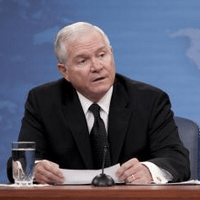U.S. Defense Secretary Robert Gates unveiled his much-anticipated budget cuts last Thursday, signaling the beginning of the end of the decade-long splurge in military spending triggered by Sept. 11. Gates presented the package of cuts as being the biggest possible given the current international security landscape, warning that any deeper reductions could prove "potentially calamitous." Frankly, I find that statement hard to swallow.
How can America basically match the rest of the world's defense spending combined, and then describe anything less as "potentially calamitous"? Clearly, given the "nation's grim financial outlook," as Gates himself put it, we're going to have to come up with a more-realistic force-sizing principle, rather than simply adding new threats to the list while never having the courage to trim back less-plausible ones.
Much like with the dollar's declining status as global reserve currency, Americans are going to have to admit that we cannot and should not seek to dominate the global security system as much as we have, by default, over the past two decades. Far from being a bad thing, this is a tremendous achievement. America spent the second half of the 20th century building an international order premised on the notion that encouraging the trade-fueled rise of fellow great powers would create a better world.

